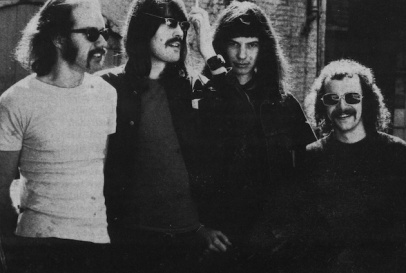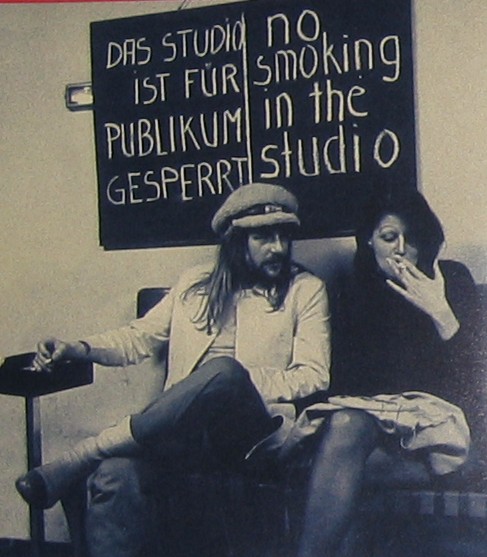Chapter Five - Kings and Queens, The End of an Ear, and of course Kevin Ayers (1971)

Tanglewood Tails, 1971
Tanglewood Tails formed in late 1970 by former three former Soft Machine members: Mike Ratledge on keyboards, Hugh Hopper on bass, and Elton Dean on saxophone. The band was named after a piece performed by Robert Wyatt and the Hopper brothers in 1963. Due to them initially not finding an available drummer that suited their needs, Soft Machine member Robert Wyatt temporarily took up drum duties.
“I was mainly brought onto the band as a sort of placeholder, and I was on a good majority of the tracks, except for stuff like Grides and Blind Badger.”
Robert Wyatt, 1997
The album also included a song recorded during Soft Machine’s Fourth sessions that was ultimately left out from that album, Out-Bloody-Rageous. During recording sessions, the band also held auditions for a new drummer. At the end of the auditions, Australian drummer Phil Howard was hired as the band’s permanent drummer, with Wyatt giving his approval of Howard before leaving. The album was released on February 21st, 1971 by CBS.


Front Cover Back Cover
Gatefold
Side A:
Teeth (9:15) (Mike Ratledge) [1]
Blind Badger (6:46) (Elton Dean) [2]
Mousetrap (5:02) (Hugh Hopper) [3]
Side B:
Eamonn Andrews (6:23) (Ratledge) [3]
Neo-Caliban Grides (6:58) (Dean) [2]
Kings and Queens (5:01) (Hopper) [1]
Fletcher’s Blemish (4:38) (Dean) [1]
Side C:
Virtually (20:19) (Hopper) [1]
Side D:
Out-Bloody-Rageous (19:15) (Ratledge) [4]
Released: February 28th, 1970
Top position in US charts: N/A
Top position in UK chats: #32
Track sources:
[1] - Fourth, 1971
[2] - Elton Dean - Elton Dean (Just Us), 1971
[3] - The Peel Sessions. 1990
[4] - Third, 1970

Robert Wyatt, 1971
Following his leave from Tanglewood Tails, Robert Wyatt went on to record a solo album, titled The End of an Ear, with the assistance of Neville Whitehead on bass, Mark Charig on cornet, Elton Dean on saxophones, Mark Ellidge on piano, Cyrille Ayers on “assorted percussion”, and Dave Sinclair on organ. It is primarily a free jazz album with experimental music elements (notably in the wordless vocals by Wyatt). It was released on June 4th, 1971 by Harvest.


Front Cover Back Cover
Side I:
Las Vegas Tango, Part I (Repeat) (8:13) (Gil Evans) [1]
To Mark Everywhere (2:26) (Wyatt) [1]
To Saintly Bridget (2:22) (Wyatt) [1]
To Oz Alien Daevid and Gilly (2:09) (Wyatt) [1]
To Nick Everyone (9:15) (Wyatt) [1]
Side II:
To Caravan and Brother Jim (5:22) (Wyatt) [1]
To the Tangled Ones (Thank You for the Use of your Body, Goodbye) (3:18) (Wyatt) [1]
To Carla, Marsha and Caroline (For Making Everything Beautifuller) (2:47) (Wyatt) [1]
Las Vegas Tango, Part I (11:07) (Wyatt) [1]
Released: June 4th, 1971
Top position in UK charts: N/A
Top position in US charts: N/A
Track sources:
[1] - The End of an Ear
To the Tangled Ones - To the Old World
:format(jpeg):mode_rgb():quality(90)/discogs-images/A-919595-1360596502-7798.jpeg.jpg)
Kevin Ayers with The Whole World, 1971
Meanwhile, at Abbey Road Studios, Kevin Ayers was preparing to record his debut album. He assembled a band called The Whole World, consisting of David Bedford on organ and piano, Lol Coxhill on saxophone, Mike Oldfield on bass, guitar and vocals, Mike Fincher on drums and percussion, and an uncredited chorus on backing vocals.

Puis Je? / Jolie Madam - Harvest 1971
With Ayers himself and Peter Jenner at the production helm, recording started in February of 1971. The album consisted of songs written as early as 1966, and songs that were written and preformed during Soft Machine's 1970 tour. A single was put out in France to promote the album in August 1971, Puis Je? / Jolie Madame. The Whole World played some live shows in the UK and France to promote the album, yet the band broke up soon after the album’s release.
“I was a little disappointed that we split so quickly, but really, it was for the better, considering what would happen next.”
Kevin Ayers, 1977


Front Cover Back Cover

Gatefold
Side A:
May I? (4:01) (Kevin Ayers) [1]
Rheinhardt & Geraldine / Colores Para Dolores (5:41) (Ayers) [1]
Lunatics Lament (4:53) (Ayers) [1]
Pisser Dans Un Violon (8:02) (Ayers) [1]
Side B:
The Oyster and the Flying Fish (2:37) (Ayers) [1]
Underwater (3:52) (Ayers) [1]
Gemini Child (3:16) (Ayers) [2]
Red Green and You Blue (3:52) (Ayers) [1]
Hat (5:27) (Ayers) [2]
Released: August 1971
Top position in UK charts: #78
Top position in US charts: N/A
Track sources:
[1] - Shooting at the Moon, 1970
[2] - Odd Ditties, 1976
Almost immediately following the breakup of The Whole World, Ayers travelled to Majorca, where he would happen to run into Wyatt. Talks about reforming Soft Machine took place soon after. However, the two felt hesitant about using the Soft Machine name due to the absence of essentially more than half of the original band. They then instead opted to form a new band with a new name, Matching Mole, a play on the french translation of Soft Machine, Machine Molle. The new band consisted of Wyatt on drums and vocals, Ayers on guitar and vocals, former Caravan keyboardist Dave Sinclair on piano and organ, Bill MacCormick on bass, and Phil Miller on guitar.


Terrific updates! Loved the AH version and love this blogspot version too!
ReplyDeleteThanks! I mainly spruced up the tracklists of Kevin's album a bit, making it more similar to OTL's
Delete